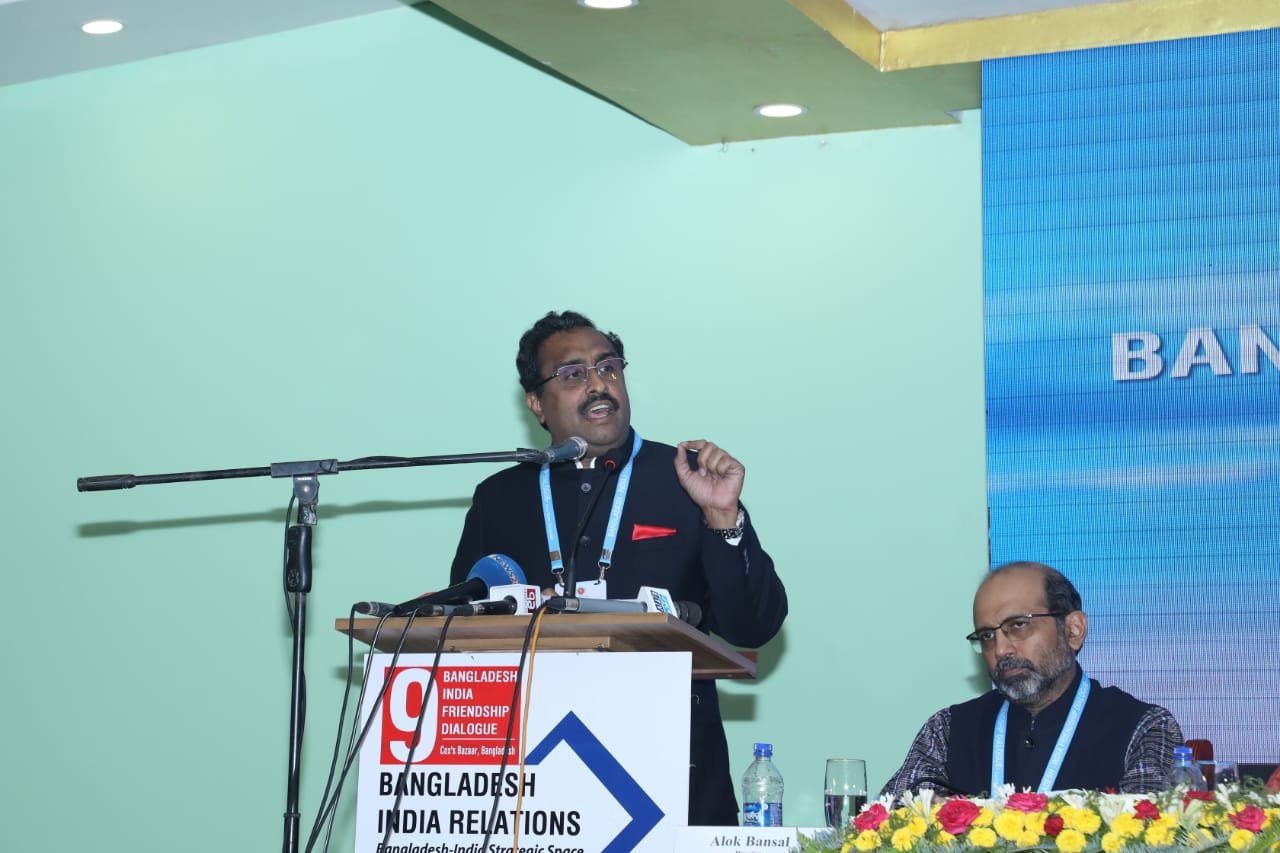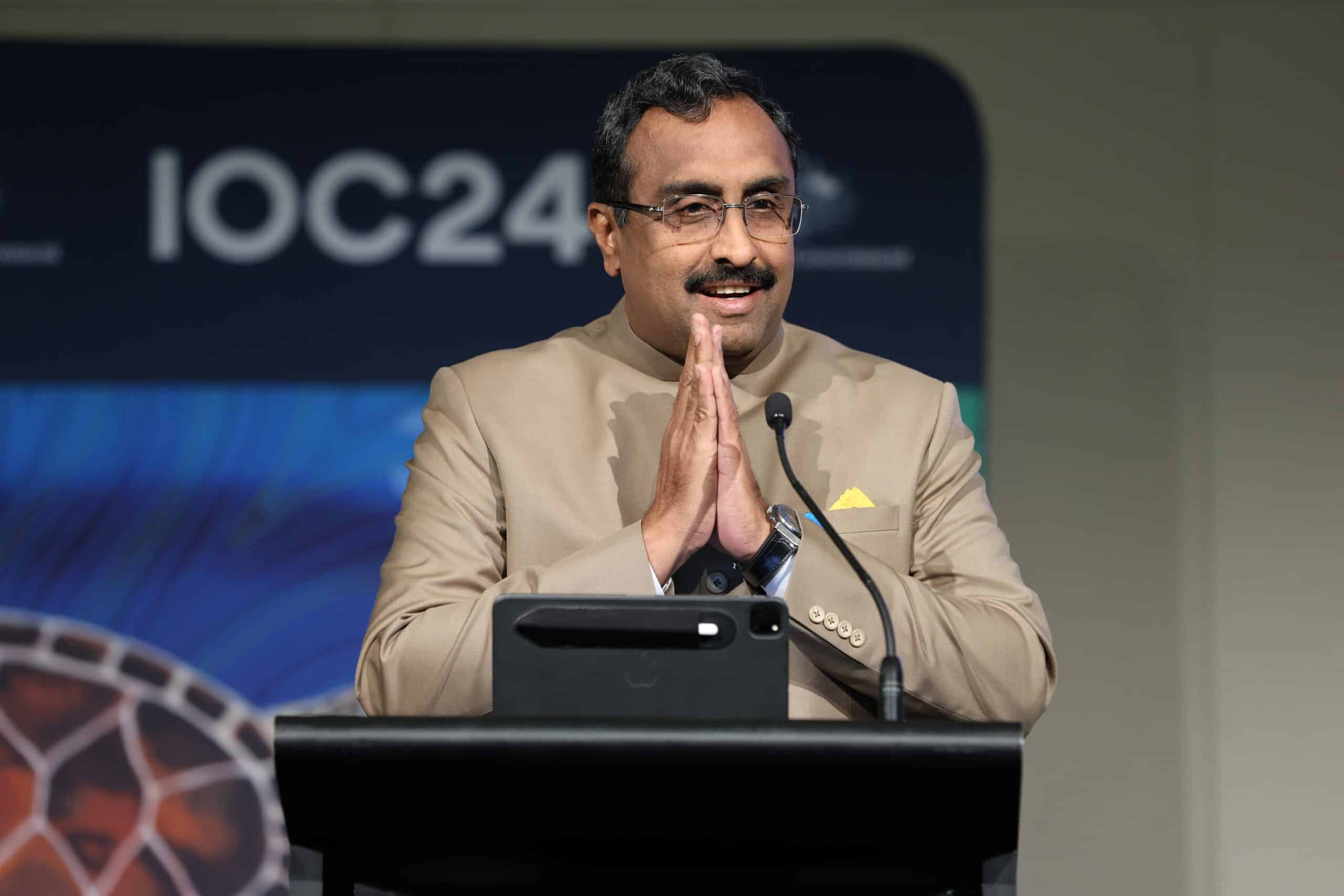
|
Getting your Trinity Audio player ready...
|
Text of Shri Ram Madhav’s address at the 9th Round of Bangladesh-India Friendship Dialogue hosted by India Foundation and Bangladesh Foundation for Regional Studies at Cox’s Bazaar, Bangladesh
Namaskar.
On behalf of the delegation from India, my party and people of India, let me extend my Warm Greetings to the participants of this 9th round of Bangladesh – India Friendship Dialogue in this beautiful sea-side city of Cox’s Bazar. Greetings to the People of Bangladesh too.
This dialogue is happening less than a month after an important bilateral visit. The Hon’ble Prime Minister and beloved leader of the people of Bangladesh Her Excellency Sheikh Hasina was in India in the first week of October. She addressed the World Economic Forum meeting at Delhi besides holding bilateral meetings with our Hon’ble Prime Minister His Excellency Narendra Modi.
Our two Prime Ministers are providing truly historic leadership in our respective countries. Both enjoy massive popularity among the ordinary citizens of our countries. Both have demonstrated unparalleled commitment to good governance, fight against corruption and grassroots development. Both have upheld democratic values, secular principles and peace and stability.
We are fortunate that under the leadership of PMs Modi and Sheikh Hasina, our two countries have further strengthened bilateral bonds. During the visit of Bangladesh Prime Minister to India last month, the two countries have signed a large number of MoU’s in important areas like ports, river waters, education, culture, youth, Line of Credit etc.
Friends! It is not the content of these agreements that is important; it is the sentiment that needs to be underscored. In an era of so-called ‘strategic partnerships’, India-Bangladesh relationship is something that transcends strategic partnership; it is a relationship seeped in deep historical and fraternal ties based on sovereignty, equality, trust and understanding.
We are not just neighbours in physical sense. We do not only share boundaries; but share a cultural and civilisational history. We share a value system of commitment to democracy, peace, secularism and equitable development.
People of Bangladesh had experienced a different type of political value system for more than two decades before returning to their own value system in 1971 after a long struggle. Incidentally the value system that they had returned to was not the one that they inherited from the system from which they parted way in 1971; rather it was the value system that they had to part ways with in 1947, to which they had returned in 1971. In that sense, we, the Indians and the Bangladeshis are civilisational cousins with shared values. This relationship is an irreversible relationship.
Bangladesh’s return to its own was not an easy transition. People of Bangladesh had had to make to tremendous sacrifices to achieve independence in 1971. India cherishes its role in supporting the just war of the people of Bangladesh for their independence. Mukti Jodhas of the Mukti Bahini, with the support of India, had waged a great war to liberate Bangladesh from the clutches of an unjust and undemocratic system.
We thankfully remember the gesture of PM Sheik Hasina in presenting the Bangladesh Liberation War honour to Shri Atal Bihari Vajpayee, which was received by PM Modi during his visit to Dhaka in 2015.
Talking of that great war for independence, one can’t forget the exemplary leadership provided by Bangabandhu Sheik Mujibur Rehman. One has to read former US diplomat, who was stationed at Dhaka at that time, Mr. Gary Bass’s book ‘Blood Telegram’ to understand how brutal and challenging the war had been. It was the leadership of Bangabandhu that had steered the people through those challenging times and secured them independence.
We pay our respectful homage to the memory of the Father of Bangladesh, and hope to be an active partner in his birth centenary celebrations that Bangladesh would be celebrating next year under the leadership of the able daughter of that noble father, PM Sheik Hasina. We reiterate our support to the vision of Bangabandhu and PM Sheik Hasina of building a peaceful, prosperous and developed Bangladesh.
Friends, Our two countries have travelled a long way together. This journey, based on the principles of mutual respect and sovereign equality will continue. We are proud of the economic progress that Bangladesh is registering under the visionary leadership PM Sheik Hasina. You have successfully uplifted millions of people out of poverty. Your economy is one of the strongest in the region. India believes in the Modi dictum of ‘Together We Grow’, and sees an opportunity for India in Bangladesh’s development.
India too, under PM Modi, is working hard to bring millions out of poverty and underdevelopment through unique programs of skilling and innovation. We are sharing our expertise with Bangladesh through appropriate governmental mechanisms.
Our waters, our ports, our communication networks, our railways, our roads, – all of them remind us of the principle ‘Together We Grow’. Our progress is through shared paths, in water, land and air. Ports in Cox’s Bazar and Chittagong can be of great help in the economic development of India’s north east. We are committed to the implementation of Teesta Water Agreement after due consultation with all the stakeholders. Similarly the HIRA – Highways, i-ways, Railways and Airways – is another mutually beneficial relationship that we are taking forward.
We have recently added a new dimension of the e-way, the energy relationship. Bangladesh has helped transport equipment through its territory for a power plant in Tripura recently and the power produced there is being supplied to Bangladesh. Similarly we have entered into an agreement with Bangladesh to import CNG into Tripura thus addressing the energy needs of our north east.
Bangladesh used to be described in the past as a land-locked country. On a lighter vein, you are lucky to be having a very dear friend India on all sides. You know well that we are not that lucky. But, today’s reality is that Bangladesh is an important gateway to the Indian Ocean. By connecting with India’s north east, Bangladesh is actually becoming a gateway to countries like Bhutan, Nepal, Western Tibetan region of China, and North-Western Myanmar.
It is time Bangladesh realised the great potential waiting to be unlocked and revised its foreign policy to develop a cogent and vibrant Indian Ocean Vision. India wishes to see Bangladesh emerging as an important Indian Ocean power and playing a proactive role in managing the affairs of the most happening region together with India and ASEAN neighbours.
Friends, we have our challenges too. We have to manage our borders with due diligence. We have challenges like cattle smuggling, narco trade and fake currency. Sometimes these illegal activities lead to unfortunate incidents along the border points and even to some casualties. India and Bangladesh have to together ensure peace and order along the border.
We have built a fence along the large portions of our border to address some of these challenges. Remaining portions will also be completed through mutual cooperation. However, the fencing is not to divide our people, but only to secure them. Our two countries have decided to open 12 border haats to unite the people.
Illegal migration is another big challenge that our two countries face. India has devised legal mechanisms to handle illegal migration internally. We handle the challenge of illegal migration with stern legality and gentle humanity.
Bangladesh too faces a daunting challenge of infiltration in the forms of hundreds of thousands of Rohingyas. India stands by Bangladesh in its efforts to tackle this challenge both on humanitarian front as well as the diplomatic front. We have extended fifth trench of humanitarian assistance including tents, food and medicines to Bangladesh government for the Rohingya rehabilitation.
We also support Bangladesh’s efforts through diplomatic channels for a permanent solution. It is important that the living conditions of Rohingya people in the Rakhine province need to improve. Towards that end India is extending development support in the form of housing etc to that province.
The most serious challenge that not just our two countries, but the entire democratic world faces today is terrorism, in some cases state-sponsored. Under Prime Minister Modi, India has not only demonstrated zero tolerance to terrorism, but also shown a resolve to neutralise terror at its breeding grounds itself. We have taken bold measures to enter the dens of the terror factories and destroy terror infrastructure there.
We delightfully acknowledge PM Sheikh Hasina’s unequivocal commitment to not allowing terror to gain any foothold on the soil of Bangladesh. It is not enough to tackle terrorists alone; it is important to tackle those underground and overground forces that act as catalysts for terror, financing, training and sponsoring, and many a times misusing religion for that purpose.
Dear Friends! We have crossed many milestones in our journey together. Many more have to be crossed. As former Indian Prime Minister Vajpayee had said in our parliament once, ‘Our friendship is like a bond that would never break under any pressure and would never be a victim of any diplomacy’.
This year is the 150th Birth Anniversary of Mahatma Gandhi. We thank PM Sheikh Hasina for agreeing to release a postal stamp in Gandhiji’s memory.
Next year is the Birth Centenary of the Father of the Nation for Bangladesh, Banga Bandhu Mujibur Rehman. We look forward to joining the government and people of Bangladesh in celebrating that event.
And in 2021 will come the historic 50th anniversary of the revolution and the birth of Bangladesh. It is also the golden jubilee year of our bilateral relations. India was the first country to recognise independent Bangladesh.
Let all these occasions be opportunities for further strengthening of our bilateral ties and milestones in the history of our two countries.
I wish the conference a success.



